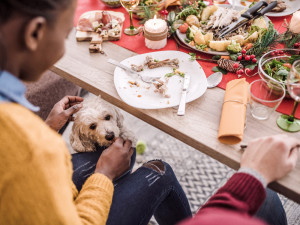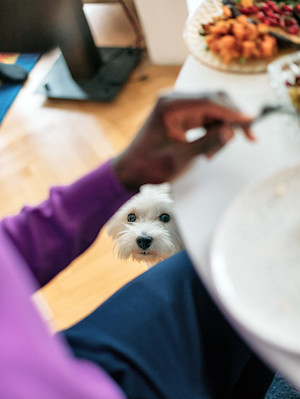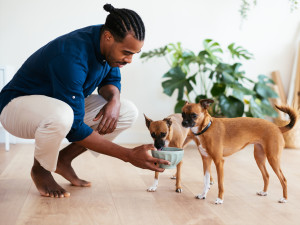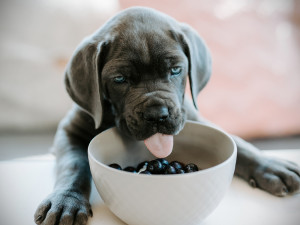Foods Your Dog Can’t Eat
Even if they aren’t too proud to beg, you shouldn’t let your pup in on these snacks.

Share Article
In This Article:
What Human Foods Can Dogs Not Eat? What Do You Do If Your Dog Has Eaten a Toxic Food? Signs of Poisoning in Dogs When Do You Go to the Vet for Eating Toxic Food? Foods That Are Dog-Safe Frequently Asked Questions
If you asked your pup what human foods are toxic to dogs, the answer would undoubtedly be “none.” When your dog sees you eating anything that smells or looks appealing, they want it — no questions asked. It’s like you and your favorite ice cream sundae. All reason goes out of your head.
On top of that, a dog doesn’t have the information you do. We know what’s bad for us. They don’t. Unfortunately, many human foods are toxic to dogs. It’s your job as a pet parent to know what they are or at least how to find out. This guide provides a look from A to Z at human foods that are toxic to dogs. It is not, by any means, comprehensive. The list would be too long for one article. But it will give you an idea of what foods are toxic to dogs, how to recognize signs of poisoning, when to call the vet, and some safe foods.

What human foods can dogs not eat?
Below is a list of common human foods that are toxic to dogs.
Alcohol
Alcohol is an absolute no. Even small amounts of alcohol can cause intoxication, vomiting, diarrhea, difficulty breathing, and central nervous system depression in dogs. In severe cases, it may lead to coma or death. This includes alcoholic beverages, yeast dough, and foods cooked with alcohol. So, don’t leave any half-full glasses sitting around after your late-night party. Take the time to clean up.
Avocado
Avocados contain a toxin called persin, which can cause vomiting and diarrhea in dogs. Some dogs can handle small amounts, but the pit is a choking hazard and a potential intestinal blockage enemy. Avocado toast has become particularly popular, but after breakfast, throw out all pits.
Caffeine
Caffeine, found in many foods, such as coffee, tea, energy drinks, and chocolate, is dangerous to dogs. It can cause restlessness, rapid breathing, heart palpitations, muscle tremors, and seizures. These are additional drinks you don’t want sitting around after consuming.
Chocolate
As mentioned, chocolate contains caffeine, and it also contains theobromine, both of which are toxic to dogs. The darker the chocolate, the greater the danger. Dark chocolate and baking chocolate are especially dangerous. Symptoms include vomiting, diarrhea, elevated heart rate, seizures, and even death.
Dough
There are several reasons to avoid raw yeast dough. It can expand in your dog’s stomach, causing bloating, pain, and potential rupture. In addition, the fermentation process produces alcohol, further increasing the danger.
Garlic and onions
These allium family members can damage your dog’s red blood cells and lead to anemia. Regardless of the form (raw, cooked, powdered, or dehydrated), garlic and onions are dangerous, and your dog should never be around them or eat anything cooked with them.
Grapes and raisins
It’s unknown why, but grapes or raisins are particularly dangerous because they can cause dog kidney failure. Even a small quantity of grapes or raisins can harm. Symptoms include vomiting, lethargy, and decreased appetite. Be careful with grapes and raisins — they’re easy to drop, especially by children.
Hops
Used in beer brewing, hops can cause malignant hyperthermia (dangerously high body temperature) in dogs, which may be fatal without immediate treatment.
Macadamia nuts
These nuts can also cause hyperthermia in dogs. Symptoms are weakness, high temperature, tremors, and vomiting. Fortunately, these nuts are not usually fatal but can make your dog very ill.
Stone fruits
As mentioned, the pits of some fruits can cause choking or intestinal blockages. So keep your dog away from peaches, plums, and cherries. The pits also contain cyanogenic compounds.
Xylitol
Xylitol is in so many things that it’s impossible to list them all. This artificial sweetener, found in sugar-free gum, candy, and baked goods, causes a rapid insulin rise in dogs, leading to low blood sugar and liver failure. Even small doses are dangerous.
Artificial sweeteners
In addition to xylitol, other artificial sweeteners like saccharin and aspartame are not recommended. While not as toxic, they can still cause intestinal upset, and the long-term effects are not well studied in dogs.
Fried and fatty foods
Pancreatitis is a painful and possibly life-threatening illness. High-fat foods are often the culprit. These include fried foods, fatty meats, and fast food.
Chives and leeks
Chives and leeks can cause anemia and GI distress like onions and garlic. Keep them, in any form, away from your dog.
Rhubarb
Rhubarb leaves contain oxalates, which can lead to kidney failure, tremors, and cardiac issues. Although the stalks are less toxic, it is still suggested that dogs be kept away from them.
Cooked bones
Cooked bones splinter easily and can lead to choking, intestinal blockages, or perforations. Even though raw bones are safer, they should only be given under your watch.
Dairy products
You probably know that many dogs are lactose intolerant and can’t tolerate milk, cheese, and other dairy products. They can cause bloating, gas, and diarrhea. Blue cheese and other moldy cheeses are particularly dangerous due to mycotoxins.
Sweet, spicy, and salty snacks
Many snacks are high in salt, artificial flavoring, and spices. Examples include chips, pretzels, and processed foods, all of which can lead to sodium ion poisoning or gastrointestinal issues in dogs.
Nutmeg and cinnamon
Nutmeg is particularly toxic and can cause hallucinations, increased heart rate, and seizures. It contains myristicin, which is very toxic to dogs. While not fatally toxic, cinnamon can irritate your dog’s mouth and digestive tract.
What do you do if your dog has eaten a toxic food?
Don't wait for symptoms if you think or know that your dog has swallowed a toxin. Take the following immediate steps:
Remove the source of the toxin.
Do not induce vomiting unless specifically directed by your vet.
Call your veterinarian or the Pet Poison Helpline (855-764-7661) right away.
Monitor your dog’s behavior closely and note any changes.
Signs of poisoning in dogs
Common signs of food toxicity in dogs include:
Vomiting and diarrhea
Drooling or foaming at the mouth
Tremors or seizures
Lethargy or weakness
Increased heart rate
Pale gums
Difficulty breathing
Collapse or coma
Call or go to your vet or nearest emergency center right away.
When do you go to the vet for eating toxic food?
Any time your dog consumes a known toxic food — even in small amounts — it’s best to consult your veterinarian. However, there are times when you should seek emergency care right away. These include:
Your dog shows any of the signs of poisoning
You are unsure how much was consumed.
Your dog is a small breed or a puppy (toxins affect them more severely).
The ingested food includes chocolate, xylitol, grapes, alcohol, or macadamia nuts.
What will the vet do? They may induce vomiting depending on what the toxic is and how long it’s been since it was ingested. They may also give activated charcoal, IV fluids, anti-seizure meds, or other supportive care.
Foods that are dog safe
Many healthy, non-toxic foods are available if you sometimes want to share your food with your pup. Always start with a small amount of anything new and introduce it slowly.
Apples
You must remove the core and seeds because they contain cyanide. Apples are a good way to add extra fiber and vitamin C to your dog’s diet.
Bananas
Rich in potassium and vitamin B6, bananas are a great treat in small portions. You shouldn’t give too much due to their sugar content.
Blueberries
Packed with antioxidants and safe in moderation, blueberries are a good treat for training and enrichment.
Carrots
Carrots are good for teeth due to their crunchy texture. They are also low in calories and high in fiber and vitamin A.
Cheese
Dogs usually enjoy cheese, and can have some in small amounts. Be sure to give low-fat cheese so as to avoid pancreatitis, and stay away from moldy or flavored types.
Eggs
Cooked eggs provide protein and are generally safe for dogs. Avoid raw eggs due to the risk of salmonella.
Peanut butter
Dogs love peanut butter. Be sure to read the label and use unsweetened, xylitol-free peanut butter as a treat or to hide medication.
Fish
Great for your dog’s haircoat and skin, salmon and sardines are rich in omega-3 fatty acids. Always cook thoroughly and remove bones to prevent choking or obstruction.
Turkey
Lean turkey (without skin or bones) is a good source of protein. Avoid seasoned or deli-style turkey meats.
Bottom line: What foods can dogs not eat?
Dogs have toxic reactions to many of the foods that people eat. It’s impossible to list them all, but research before giving your dog something new. A food isn’t healthy for your dog just because it’s good for you. It’s not necessarily good because it says natural or organic.
Human foods can be toxic or potentially cause choking or intestinal obstructions. Foods that are too fatty can lead to pancreatitis. Knowing what to keep out of your dog’s reach can prevent emergencies.
FAQs
What foods are dogs not allowed?
Dogs should avoid toxic items like chocolate, grapes, onions, garlic, macadamia nuts, alcohol, xylitol, and caffeine. Although not toxic, high-fat items which can cause pancreatitis and obesity should be avoided. Other problematic foods include spicy snacks, cooked bones, and high-sodium items.
What three meats should dogs avoid?
Dogs should avoid:
Processed deli meats — often high in sodium and nitrates.
Fatty meats — like bacon or sausage, which can cause pancreatitis.
Raw or undercooked meats, due to bacteria like Salmonella and E. coli.
What fruits can dogs not eat?
Avoid giving dogs:
Grapes and raisins — toxic to kidneys.
Cherries and peaches — pits are choking hazards and contain cyanide.
Citrus fruits — can cause stomach upset.
References
Backer, Lorraine, et al. “Canine Cyanotoxin Poisonings in the United States (1920s–2012): Review of Suspected and Confirmed Cases from Three Data Sources.”opens in new tab Toxins, vol. 5, no. 9, 24 Sept. 2013, pp. 1597–1628.
Cortinovis, Cristina, and Francesca Caloni. “Household Food Items Toxic to Dogs and Cats.”opens in new tab Frontiers in Veterinary Science, vol. 3, no. 26, 22 Mar. 2016.
Salgado, BS, et al. “Allium Species Poisoning in Dogs and Cats.”opens in new tab Journal of Venomous Animals and Toxins Including Tropical Diseases, vol. 17, no. 1, 2011, pp. 4–11.

Kate Sheofsky
Kate Sheofsky hails from San Francisco, where she developed a love of writing, Giants baseball, and houses she can’t afford. She currently lives in Portland, OR, and works as a freelance writer and content strategist. When not typing away on her laptop, she enjoys tooling around the city with her two rescue pups searching for tasty food and sunny patios.

Dr. Chyrle Bonk, DVM
Dr. Chyrle Bonk has been a mixed-animal veterinarian since 2010, with a special interest in rehabilitation. When she's not practicing or writing about veterinary medicine, you may find her exploring the outdoors with her family or tending to her cows, horses, chickens, or cats and dogs.

Dr. Shelby Neely, DVM
Dr. Shelby Neely is a freelance writer and veterinarian who graduated from the University of Pennsylvania School of Veterinary Medicine and has practiced veterinary medicine for 30 years, specializing in small animals. Her work has appeared in Allivet, AsktheCatDoctor, WhiskerDocs, Ask the Cat Doctor Radio, Ask the Cat Doctor TV, and numerous other websites, brochures, newsletters, newspapers, and ebooks. In her spare time, Dr. Neely likes to spend time with her three children, two grandchildren, three cats, two grand-cats, and five grand-dogs.
Related articles
![black and white dog looking ill laying on couch]()
Warning Signs Your Dog Needs to Go to the ER — Stat
Trust me, I’m a vet.
![Man crouching down to let two dogs eat out of a bowl]()
How Many Treats Is Too Many?
The key to curbing mindless snacking — this is for your dog.
![A person giving a banana to a dog.]()
10 Fruits and Vegetables That Your Dog Can Feast On
Indulge your pup (safely) with these delicious and healthy snacks.
![Puppy eating a bowl of blueberries]()
10 Superfoods You Should Share With Your New Dog
From kale to quinoa, these nutrient-packed picks deserve a spot in your dog’s food bowl.
Can Dogs Taste Spice, and Do They Enjoy Eating Spicy Foods?







